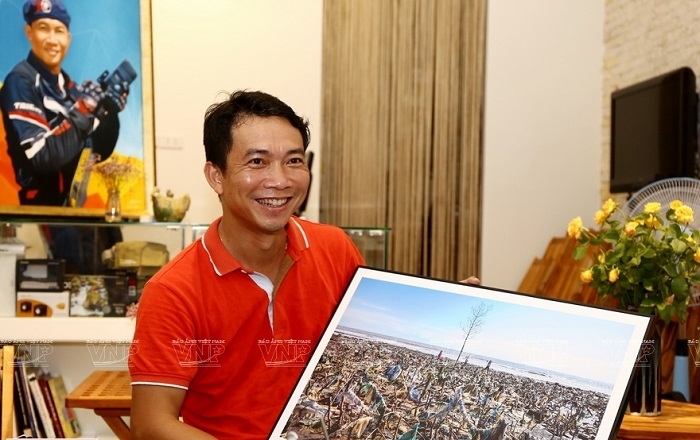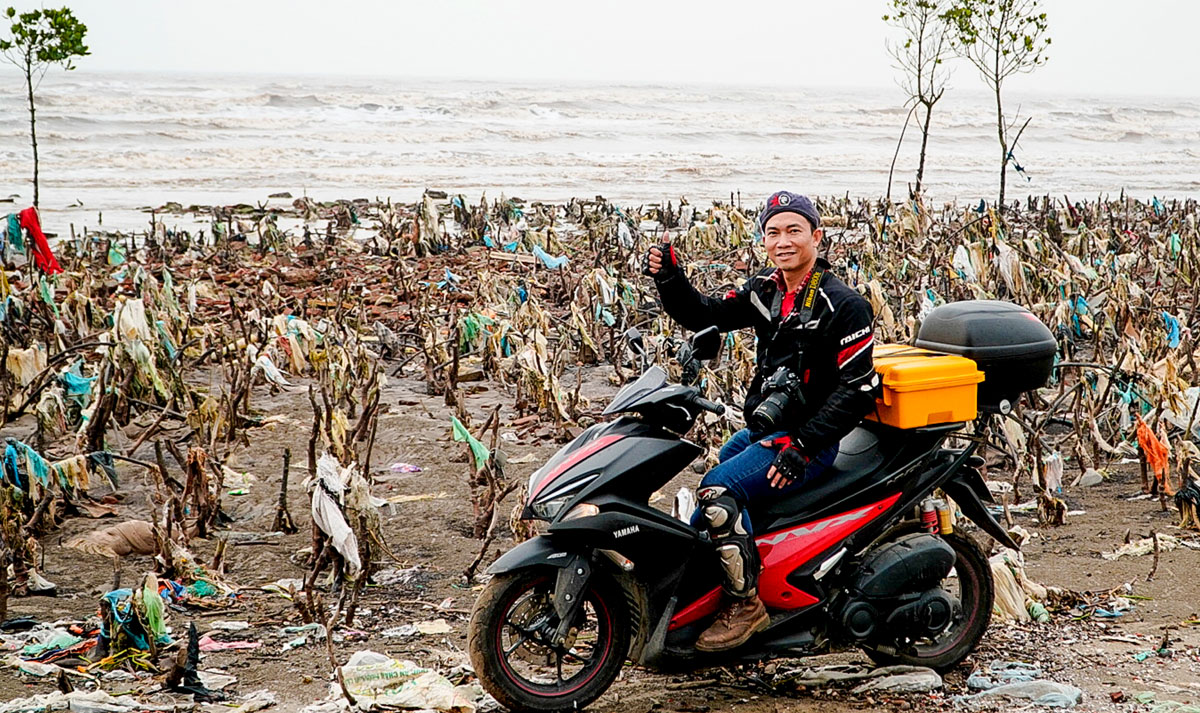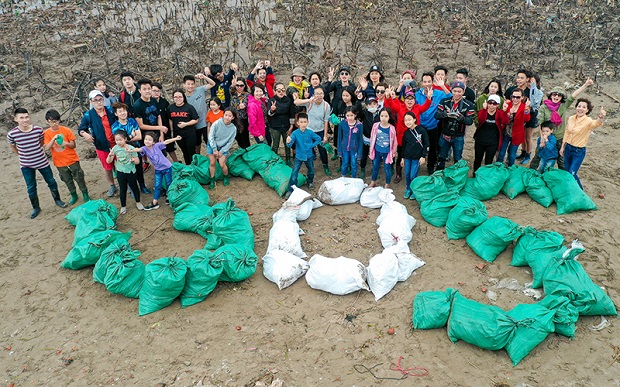Plastic waste pollution is no longer a new problem to the public as it has been under the spotlight of the press and media in recent years. However, visitors to the ongoing exhibition entitled ‘Plastic Tale of River’ in Hanoi are still impressed with the realistic photos on ocean plastic pollution in many residential areas and coastal tourist attractions across Vietnam.

Photographer Nguyen Viet Hung (Photo: Vietnam Pictorial)
The exhibition displays artworks by photographers Truong Dai Duong and Nguyen Viet Hung as well as video clips and short films incorporating messages on plastic waste reduction.
Photographer Nguyen Viet Hung brought to the event a collection of his photos and video clips selected from the 3,000 captured during his trans-Vietnam journey by motorbike along the coastline of 28 provinces and cities.
Although Hung is not the first photographer to pursue this topic, his photos has caught special attention from the public thanks to his realistic, authentic, and systematic camera angles.
The 1977-born photographer said that, having a passion for photography and teaching photography for a long time, he understands the value of the information and emotion that photos can convey to viewers. One moment can replace a thousand words, thus a photo can change perceptions and lead to actions, he stated.
A few years ago, Hung was surprised to hear that Vietnam ranked fourth among countries which have the biggest volume of plastic waste in the world. This fact urged him to embark on a journey along the coast of the country to “hunt” pictures of plastic waste, thus raising public awareness of the issue.
Travelling from the north to the south, he captured thousands of photos featuring beaches covered in plastic bags; people eating, drinking, and living amidst garbage; animals living at landfills; and children playing in piles of garbage.

Nguyen Viet Hung embarked on a journey along the coast of the country to “hunt” pictures of plastic waste.
According to statistics announced by the Ministry of Natural Resources and Environment in 2021, Vietnam around 1.8 million tonnes of plastic waste every year, including more than 30 billion plastic bags. Every household in Vietnam use approximately 1 kilogramme of plastic bags per month on average, only 17 percent of which is reused and recycled.
Since they were publicised on social networks, newspapers and media campaigns, Viet Hung's photos have received great attention, sharing and interaction from the public. Hung selected more than 100 photos from the project to display at an exhibition entitled ‘SOS - Save Our Seas’ in 2019.
It is heartening that many of the polluted places which were reported on his photos have witnessed positive changes in their appearance as the local government and people have taken prompt actions to clean up beaches. Local youth groups and social organisations have also organised activities to collect garbage along the beaches.
Hung still keeps in mind the humming sound of flies during his trip along the coastline, instead of the murmuring waves. Many roads leading to beautiful beaches or coastal landscapes are surrounded by garbage.
Viet Hung has participated in many photo exhibitions and anti-plastic waste communication programmes, during which he shared about the memorable stories and life scenes behind his photos. He also published a book named ‘Du Ky Xanh’ (A Green Journey) about his trash-hunt journey to save the sea.
He was awarded the ‘Ambassador of Blue Ocean’ title by the Ministry of Natural Resources and Environment.

Phototographer Nguyen Viet Hung and his friends take a group photo during their trip to clean up trash on the beach in Nam Dinh province (Photo courtesy of Nguyen Viet Hung)
Sharing about his upcoming plans, Hung said he will continue to make trips to take pictures of the sea and islands of Vietnam, which boast great tourism potential, but the garbage disposal problem has not yet due attention.
He has also hosted clean-up trips in many beaches and worked on his ‘Save our seas’ website, which updates viewers on plastic pollution facts and information, thus calling for joint effort to keep the oceans clean.
According to Hung, everyone can contribute to environmental protection in different ways, from simple things. As for him, he utilises the art of photography to convey his love of nature, and send an alarming reality of plastic pollution.
“If we do not take action now, our children and grandchildren will certainly suffer the consequences of plastic waste,” he said, adding that he wants to contribute a voice change people’s awareness and action to make Vietnam's sea cleaner and more beautiful.
|
The ‘Plastic Tale of River’ exhibition is co-organised by the Institute of Strategy, Policy on Natural Resources and Environment (ISPONRE), the Embassy of the Kingdom of Netherlands, the World Wide Fund for Nature in Vietnam (WWF Vietnam), the National Plastic Action Partnership (NPAP), and the Goethe-Institute.
The exhibition is among the activities within the framework of the project Rethinking Plastics – Circular Economy Solution for Marine Waste, funded by the European Union and the German government, and executed by German GIZ and French Expertise France in Vietnam.
The exhibition will run until March 15 at the Goethe Institute, 56-58-60 Nguyen Thai Hoc Street, Ba Dinh District Hanoi. During the period, the institute has coordinated with the ISPONRE to develop a virtual exhibition model on the Gathertown application to reach more interested audience as well as support to organise a series of side events that contribute to identifying practical solutions regarding policy, technical and communication aspects to reduce the consumption of single-use plastic bags and products.
|